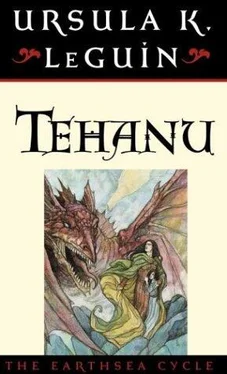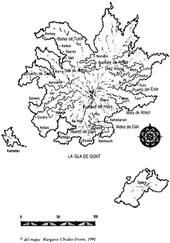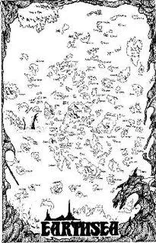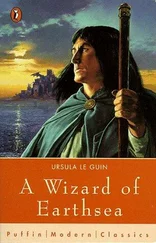Ursula Le Guin - Tehanu The Last Book of Earthsea
Здесь есть возможность читать онлайн «Ursula Le Guin - Tehanu The Last Book of Earthsea» весь текст электронной книги совершенно бесплатно (целиком полную версию без сокращений). В некоторых случаях можно слушать аудио, скачать через торрент в формате fb2 и присутствует краткое содержание. Город: New York, Год выпуска: 1990, Издательство: Atheneum, Жанр: Фэнтези, на английском языке. Описание произведения, (предисловие) а так же отзывы посетителей доступны на портале библиотеки ЛибКат.
- Название:Tehanu The Last Book of Earthsea
- Автор:
- Издательство:Atheneum
- Жанр:
- Год:1990
- Город:New York
- ISBN:нет данных
- Рейтинг книги:4 / 5. Голосов: 1
-
Избранное:Добавить в избранное
- Отзывы:
-
Ваша оценка:
- 80
- 1
- 2
- 3
- 4
- 5
Tehanu The Last Book of Earthsea: краткое содержание, описание и аннотация
Предлагаем к чтению аннотацию, описание, краткое содержание или предисловие (зависит от того, что написал сам автор книги «Tehanu The Last Book of Earthsea»). Если вы не нашли необходимую информацию о книге — напишите в комментариях, мы постараемся отыскать её.
Tehanu The Last Book of Earthsea — читать онлайн бесплатно полную книгу (весь текст) целиком
Ниже представлен текст книги, разбитый по страницам. Система сохранения места последней прочитанной страницы, позволяет с удобством читать онлайн бесплатно книгу «Tehanu The Last Book of Earthsea», без необходимости каждый раз заново искать на чём Вы остановились. Поставьте закладку, и сможете в любой момент перейти на страницу, на которой закончили чтение.
Интервал:
Закладка:
It was a winter of heavy snows on Gont, and a long winter. The harvest had been a good one. There was food for the animals and people, and not much to do but eat it and stay warm.
Therru knew the Creation of E`a all through. She spoke the Winter Carol and the Deed of the Young King on the day of Sunreturn. She knew how to handle a piecrust, how to spin on the wheel, and how to make soap. She knew the name and use of every plant that showed above the snow, and a good deal of other lore, herbal and verbal, that Ged had stowed away in his head from his short apprenticeship with Ogion and his long years at the School on Roke. But he had not taken down the Runes or the Lore-books from the mantelpiece, nor had he taught the child any word of the Language of the Making.
He and Tenar spoke of this. She told him how she had taught Therru the one word, tolk, and then had stopped, for it had not seemed right, though she did not know why.
“I thought perhaps it was because I’d never truly spoken that language, never used it in magery. I thought perhaps she should learn it from a true speaker of it." ‘ ‘
“No man is that.”
“No woman is half that.”
“I meant that only the dragons speak it as their native tongue.”
“Do they learn it?”
Struck by the question, he was slow to answer, evidently calling to mind all he had been told and knew of the dragons. “I don’t know,” he said at last. “What do we know about them? Would they teach as we do, mother to child, elder to younger? Or are they like the animals, teaching some things, but born knowing most of what they know? Even that we don’t know. But my guess would be that the dragon and the speech of the dragon are one. One being.”
“And they speak no other tongue.”
He nodded. “They do not learn," ‘ he said. “They are.
Therru came through the kitchen. One of her tasks was to keep the kindling box filled, and she was busy at it, bundled up in a cut-down lambskin jacket and cap, trotting back and forth from the woodhouse to the kitchen. She dumped her load in the box by the chimney corner and set off again.
“What is it she sings?” Ged asked.
“Therru?"
“When she’s alone.”
“But she never sings. She can’t.”
“Her way of singing. ‘Farther west than west.' " . . .
“Ah!” said Tenar. “That story! Did Ogion never tell you about the Woman of Kemay?”
“No,” he said, “tell me.
She told him the tale as she spun, and the purr and hush of the wheel went along with the words of the story. At the end of it she said, “When the Master Windkey told me how he’d come looking for ‘a woman on Gont,’ I thought of her. But she’d be dead by now, no doubt. And how would a fisherwoman who was a dragon be an archmage, anyhow!”
“Well, the Patterner didn’t say that a woman on Gont was to be archmage,’ ‘ said Ged. He was mending a badly torn pair of breeches, sitting up in the window ledge to get what light the dark day afforded. It was a half-month after Sunreturn and the coldest time yet.
“What did he say, then?”
“'A woman on Gont. ‘ So you told me."
“But they were asking who was to be the next archmage."
“And got no answer to that question.”
“Infinite are the arguments of mages," said Tenar rather drily.
Ged bit the thread off and rolled the unused length around two fingers.
“I learned to quibble a bit, on Roke,” he admitted. “But this isn’t a quibble, I think. ‘A woman on Gont’ can’t become archmage. No woman can be archmage. She’d unmake what she became in becoming it. The Mages of Roke are men-their power is the power of men, their knowledge is the knowledge of men. Both manhood and magery are built on one rock: power belongs to men. If women had power, what would men be but women who can’t bear children? And what would women be but men who can?”
“Hah!” went Tenar; and presently, with some cunning, she said, “Haven’t there been queens? Weren’t they women of power?”
“A queen’s only a she-king," ‘ said Ged.
She snorted.
“I mean, men give her power. They let her use their power. But it isn’t hers, is it? It isn’t because she’s a woman that she’s powerful, but despite it."
She nodded. She stretched, sitting back from the spinning wheel. “What is a woman’s power, then?” she asked.
“I don’t think we know.”
“When has a woman power because she’s a woman? With her children, I suppose. For a while." . . . ‘ ‘
“In her house, maybe.”
She looked around the kitchen. “But the doors are shut,” she said, “the doors are locked.”
“Because you’re valuable.”
“Oh, yes. We’re precious. So long as we’re powerless. . . . I remember when I first learned that! Kossil threatened me-me, the One Priestess of the Tombs. And I realized that I was helpless. I had the honor; but she had the power, from the God-king, the man. Oh, it made me angry! And frightened me. . . . Lark and I talked about this once. She said, ‘Why are men afraid of women?’
“If your strength is only the other’s weakness, you live in fear,” Ged said.
“Yes; but women seem to fear their own strength, to be afraid of themselves.”
“Are they ever taught to trust themselves?" ‘ Ged asked, and as he spoke Therru came in on her work again. His eyes and Tenar’s met.
“No,” she said. “Trust is not what we’re taught.” She watched the child stack the wood in the box. “If power were trust,” she said. “I like that word. If it weren’t all these arrangements-one above the other-kings and masters and mages and owners- It all seems so unnecessary. Real power, real freedom, would lie in trust, not force.”
“As children trust their parents,” he said.
They were both silent.
“As things are,” he said, “even trust corrupts. The men on Roke trust themselves and one another. Their power is pure, nothing taints its purity, and so they take that purity for wisdom. They cannot imagine doing wrong.
She looked up at him. He had never spoken about Roke thus before, from wholly outside it, free of it.
“Maybe they need some women there to point that possibility out to them,” she said, and he laughed.
She restarted the wheel. “I still don’t see why, if there can be she-kings, there can’t be she-archmages."
Therru was listening.
“Hot snow, dry water," said Ged, a Gontish saying. “Kings are given power by other men. A mage’s power is his own--himself. ‘ ‘
“And it’s a male power. Because we don’t even know what a woman’s power is. All right. I see. But all the same, why can’t they find an archmage-a he-archmage?”
Ged studied the tattered inseam of the breeches. “Well,” he said, “if the Patterner wasn’t answering their question, he was answering one they didn’t ask. Maybe what they have to do is ask it."
“Is it a riddle?” Therru asked.
“Yes,” said Tenar. “But we don’t know the riddle. We only know the answer to it. The answer is: A woman on Gont.”
“There’s lots of them,” Therru said after pondering a bit. Apparently satisfied by this, she went out for the next load of kindling.
Ged watched her go. “All changed," he said. “All . . . Sometimes I think, Tenar - I wonder if Lebannen’s kingship is only a beginning. A doorway . . . And he the doorkeeper. Not to pass through.”
“He seems so young," ‘ Tenar said, tenderly.
“Young as Morred was when he met the Black Ships. Young as I was when I . . . " He stopped, looking out the window at the grey, frozen fields through the leafless trees.
“Or you, Tenar, in that dark place . . . What’s youth or age?
Читать дальшеИнтервал:
Закладка:
Похожие книги на «Tehanu The Last Book of Earthsea»
Представляем Вашему вниманию похожие книги на «Tehanu The Last Book of Earthsea» списком для выбора. Мы отобрали схожую по названию и смыслу литературу в надежде предоставить читателям больше вариантов отыскать новые, интересные, ещё непрочитанные произведения.
Обсуждение, отзывы о книге «Tehanu The Last Book of Earthsea» и просто собственные мнения читателей. Оставьте ваши комментарии, напишите, что Вы думаете о произведении, его смысле или главных героях. Укажите что конкретно понравилось, а что нет, и почему Вы так считаете.








